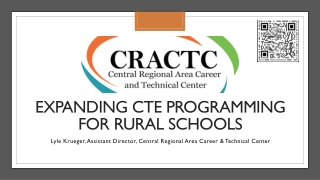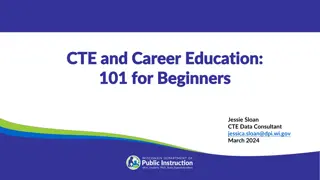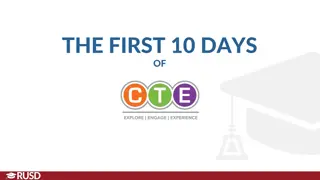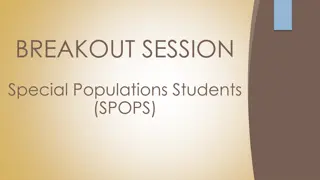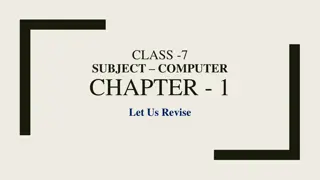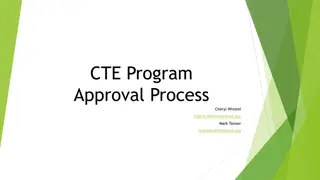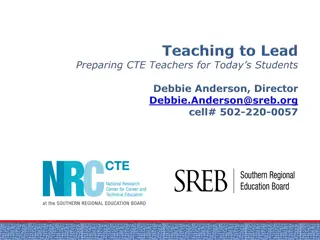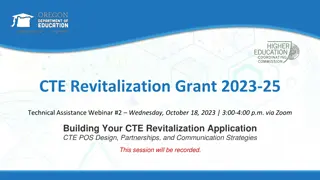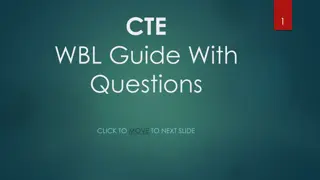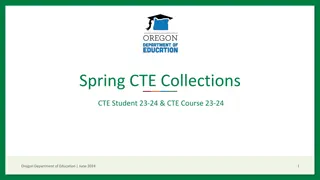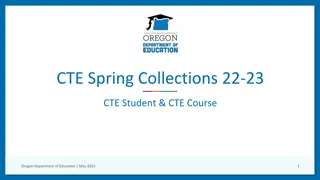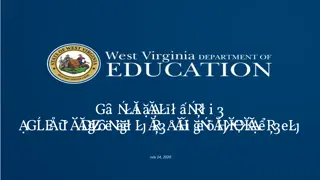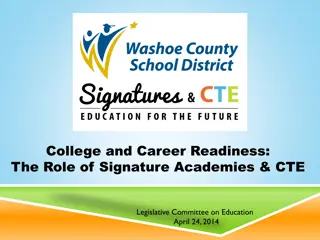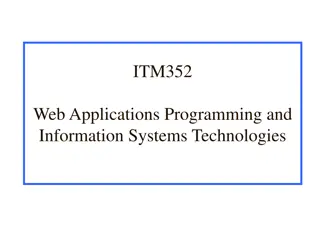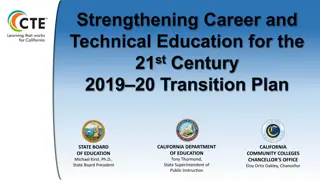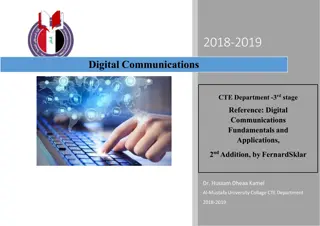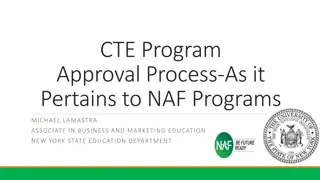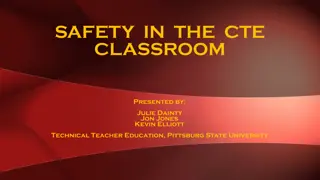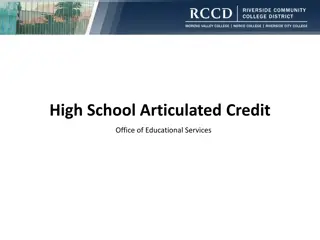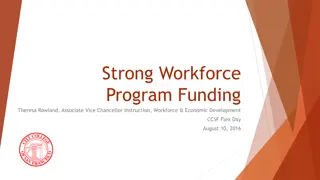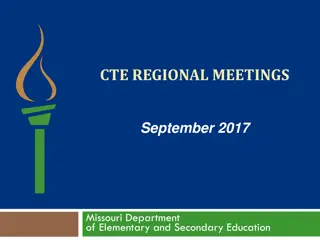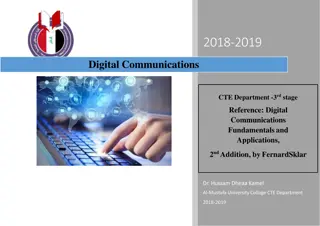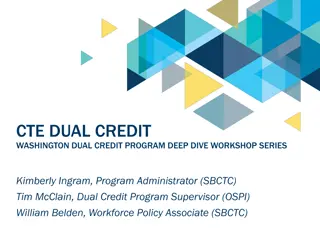Expanding CTE Programming for Rural Schools
Lyle Krueger, Assistant Director at Central Regional Area Career & Technical Center, discusses the expansion of CTE programming for rural schools in North Dakota.
0 views • 18 slides
Secondary CTE Reporting Application (SCTERA)
Access the Secondary CTE Reporting Application (SCTERA) to comply with state and federal career and technical education requirements. Upload course and student data for reporting purposes.
0 views • 18 slides
Career Education Data Team Organization Guide
Learn about Career and Technical Education (CTE) data reporting, organizing data, utilizing WISEdata and WISEdash platforms, creating a data team, defining team member roles, establishing timelines for data entry and review, and ensuring accurate collection of career education data elements. This co
1 views • 17 slides
The First Ten Days of CTE in RUSD - Building Career-Readiness
Building a consistent product through a common vision, Career Technical Education in Riverside Unified School District (CTE in RUSD) aims to provide students with opportunities to develop their competitive advantage through academic knowledge, technical mastery, and professional skills. The program
0 views • 32 slides
Analysis and Reporting for ESBOCES CTE Programs
This report delves into the purpose, goals, and population parameters of the analysis and reporting for the ESBOCES CTE programs. The aim is to enhance access to programs, increase employment opportunities, and diversify the local workforce, especially focusing on marginalized communities and non-tr
0 views • 16 slides
Decision Analysis and Operations Research in Management
This content delves into Management Decision Analysis and Operations Research techniques such as Linear Programming, Integer Linear Programming, Dynamic Programming, Nonlinear Programming, and Network Programming. It covers the phases of an Operations Research study, mathematical modeling for decisi
0 views • 36 slides
Understanding Special Populations Students in CTE Programs
Special Populations Students in Career and Technical Education (CTE) programs include individuals with disabilities, economically disadvantaged individuals, single parents, English Language Learners, migrants, homeless individuals, and more. These students may require Individualized Education Progra
0 views • 9 slides
Module 2: PSEA and Safe Programming Training of Trainers (ToT) by CRS HRD
This Module 2 focuses on PSEA and Safe Programming, covering key sessions on understanding safe programming, identifying protection and SEA risks, and mitigating risks. It emphasizes the importance of safe programming in increasing safety, dignity, and access, with staff playing a crucial role. Part
2 views • 19 slides
Understanding Computer Programming: Basics and Beyond
In this chapter, we delve into the fundamental concepts of computer programming. We explore the definition of a program, the role of programming languages, types of programming languages, and generations of programming languages. Additionally, an assignment is provided to reinforce the key learnings
0 views • 25 slides
Understanding Object-Oriented Programming (OOP) in Python
Python is a versatile programming language that supports various programming approaches. Object-Oriented Programming (OOP) is a popular method in Python where objects are created to solve programming problems. OOP in Python focuses on creating reusable code, following the principle of DRY (Don't Rep
1 views • 35 slides
Introduction to Computers and C++ Programming Lecture 1 - Overview and Basics
This lecture covers the fundamental concepts in computer systems and programming using C++. Topics include the main components of a computer, bytes and addresses in memory, computer systems hardware and software, understanding programs, programming languages, compilers, preparing and running C++ pro
1 views • 21 slides
Comprehensive Guide to CTE Program Approval Process
A detailed guide covering the CTE program approval process, deadlines, components of an approved CTE program of study, CIP code and program name significance, data approval applications, and self-study form requirements. It explains the application deadlines, consequences of missing documentation, l
0 views • 16 slides
Challenges and Solutions for Beginning Career and Technical Education Teachers
Navigating the realities of entering the educational field as a beginning Career and Technical Education (CTE) teacher can be daunting. This content explores the various challenges faced by new CTE teachers, including loneliness, loss of idealism, added responsibilities, and struggles to connect wit
0 views • 18 slides
Web Application Development and Programming CTE Program Overview
Viera High School offers a comprehensive CTE program in Web Application Development and Programming, taught by Mr. Dohmen. Students learn popular programming languages like Python, SQL, JavaScript, Java, C#, and C. The courses cover web programming, JavaScripting, and PHP programming, providing cert
1 views • 7 slides
Digital Communications Fundamentals and Applications in CTE Department 2018-2019
This content delves into the Digital Communications course in the CTE Department during the academic year 2018-2019. It covers topics such as Binary Amplitude Shift Keying (BASK), Generation and Detection of BASK, Differential Phase Shift Keying (DPSK), DPSK Generator, and the application of Digital
0 views • 16 slides
Enhancing Literacy in Career and Technical Education (CTE)
Explore the significance of integrating literacy skills in CTE, understand the importance of promoting student literacy, and discover effective assignments and strategies to engage students in reading and writing within CTE courses.
1 views • 16 slides
Introduction to Programming with RobotC in Robotics Education
Programming in robotics involves giving specific directions to a robot using software like RobotC. This introduction covers the basics of programming, software organization, and how to get started with RobotC through creating flow charts and programming tasks. Learn about setting up RobotC, creating
0 views • 8 slides
Introduction to Programming and Computer Instructions
Programming is the process of creating instructions for computers to follow and accomplish tasks. It involves turning human language instructions into detailed binary machine language. Before learning programming, individuals may have different levels of experience, ranging from no experience to pro
0 views • 16 slides
CTE Revitalization Grant 2023-25 Technical Assistance Webinar Highlights
Delve into the world of Career and Technical Education (CTE) with insights from the CTE Revitalization Grant 2023-25 Technical Assistance Webinar. Gain knowledge on CTE program design, partnership strategies, and communication methods. Explore the six career learning areas, elements of high-wage and
0 views • 19 slides
Development of Attosecond Theory for Nobel Prize through Verilog Programming
Attosecond generation is a crucial technique for creating attosecond pulses by manipulating radiation waves. This research paper focuses on developing the Attosecond generation equation through Verilog programming and validating it using test programming techniques. The interface between equations,
0 views • 15 slides
CTE Work-Based Learning Guide with Questions
This presentation guides users through a series of questions to determine if a particular experience qualifies as a Career and Technical Education (CTE) Work-Based Learning (WBL) experience. It covers aspects such as CTE skills, class involvement, teacher leadership, types of experiences, interactio
0 views • 76 slides
Understanding Special Populations Students in CTE Programs
Students who have special learning needs are considered special populations students in CTE programs. They include individuals with disabilities, economically disadvantaged individuals, single parents, English Language Learners, migrants, homeless individuals, youth in foster care, and youth with pa
0 views • 9 slides
Oregon Department of Education CTE Data Submission Guidelines
Explore the detailed guidelines provided by the Oregon Department of Education for submitting Career and Technical Education (CTE) data for the school year 2023-24. Learn about required institutions, student inclusion criteria, data security measures, data preparation, and submission processes. Unde
0 views • 25 slides
Exploring CTE Data Collections and Security Protocols in Education
Delve into the world of CTE data collections through this informational session hosted by the Oregon Department of Education. Learn about the basics of CTE data submission, resources available to data submitters, and the importance of maintaining data security and privacy. Gain insights into the str
0 views • 26 slides
Education Certification Policy Changes Due to COVID-19 Crisis
The Office of Certification has implemented flexible policies for coaching authorizations, additional coaching clarifications, professional/CTE renewal flexibilities, COVID waiver considerations, and initial professional/CTE license flexibilities in response to the COVID-19 crisis. Coaches and educa
0 views • 31 slides
CS252 Systems Programming Course Overview
This course overview covers topics such as C programming review, Unix basics, Unix systems programming, and grading details. The course includes labs on C/C++ programming, Unix shell scripting, and writing your own shell. Communication is emphasized through Piazza for questions/answers and Blackboar
0 views • 41 slides
College and Career Readiness: Connecting Signature Academies and CTE Programs
This content discusses the essential connection between Signature Academies and CTE programs in preparing students for seamless transitions to postsecondary options. It delves into the role of these programs in providing dual credit opportunities, STEM education, and advanced placement, aiming to eq
0 views • 36 slides
Introduction to Programming Languages and Functional Programming with OCaml
Welcome to Lecture 1 of CSEP505 on Programming Languages focusing on OCaml and functional programming. Professor Dan Grossman introduces the course, discusses the importance of studying programming languages, and shares insights on course mechanics and content. Topics include staff introductions, co
0 views • 84 slides
Understanding ITM352 and Its Role in MIS
Welcome to ITM352, a course focusing on acquiring basic programming skills in a business context. This course emphasizes hands-on experience in developing relevant software applications, addressing real technology problems, and fostering rapid self-learning of IS/IT technologies. Misconceptions arou
0 views • 36 slides
Strengthening Career and Technical Education for the 21st Century Transition Plan
The Strengthening Career and Technical Education for the 21st Century Transition Plan in California focuses on improving Career Technical Education (CTE) through state initiatives and investments. It outlines the outcomes, guidelines for submission of state plans, review protocols, and programs of s
0 views • 28 slides
Exploring Computer Programming Principles
Dive into the world of computer programming, covering high-level and machine languages, compilers, interpreters, writing programs, top-down design, and the array of programming languages available. Understand the essentials of building code to control computers, the diversity of programming language
0 views • 23 slides
Understanding Digital Communications Techniques in CTE Department - 3rd Stage
Explore Differential Pulse Code Modulation (DPCM) and Delta Modulation (DM) concepts in digital communications, as outlined in the 2018-2019 curriculum of the CTE Department. Learn about encoding, quantization, error prediction, reconstruction at the receiver end, and the one-bit per sample transmis
0 views • 11 slides
Understanding CTE Program Approval Process for NAF Programs in New York
This presentation delves into the alignment of NAF programs with New York's graduation pathways, requirements for CTE approved programs, and finding common ground for successful practices. It discusses the definition of an approved program of study, postsecondary credentials, and New York's regulati
0 views • 33 slides
Safety Awareness in CTE Classrooms: Practical Interventions
This presentation focuses on enhancing safety awareness in Career and Technical Education (CTE) classrooms. It addresses deficiencies in safety practices, perceived obstacles, and the importance of personal protective equipment (PPE). Strategies for creating a safer environment through lighting leve
0 views • 13 slides
CS 288-102 Intensive Programming in Linux Spring 2017 Course Details
Learn Linux programming, C language proficiency, Bash scripting, and more in this intensive course taught by Instructor C.F. Yurkoski. The course covers programming in Linux environment, command line interface, C language, client/server programming, and essential programming concepts like pointers,
0 views • 31 slides
Understanding High School Articulated Credit: Benefits, Transferability & Responsibilities
High school articulated credit allows students to earn college credit by aligning high school CTE classes with college-level courses. This collaboration between high school teachers and college professors can save students time and money by reducing the need to repeat coursework in college. Students
0 views • 8 slides
Strong Workforce Program Funding Overview
The Strong Workforce Program (SWP) aims to enhance Career and Technical Education (CTE) by providing $200 million in annual state funding to California Community Colleges. SWP focuses on accountability and allocates 60% to CC Districts and 40% to Regions. With a specific timeline since 2011, SWP sup
0 views • 10 slides
Missouri CTE Regional Meetings September 2017 Overview
Images and descriptions from the Missouri Department of Elementary and Secondary Education's CTE Regional Meetings in September 2017. The meetings covered topics such as CTE funding, high-quality CTE programs, and the purpose of the regional meetings. Details about the current funding structure, the
0 views • 59 slides
Understanding Digital Communications in CTE Department: Concepts and Applications
In the realm of Digital Communications at the CTE Department, delve into a thorough exploration of fundamental principles and practical applications. Concepts such as television signal transmission, binary PCM, quantization levels, code word lengths, transmission bandwidth, signaling rates, and nois
0 views • 8 slides
CTE Dual Credit Washington Deep Dive Workshop Series Overview
This workshop series delves deep into the CTE Dual Credit program in Washington, covering topics such as accountability, importance, research findings, challenges, and opportunities. It includes insights from program administrators and supervisors, shedding light on the Statewide Enrollment and Repo
0 views • 36 slides
